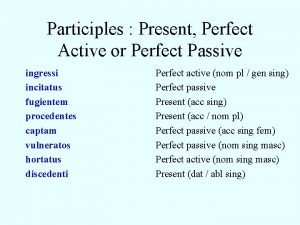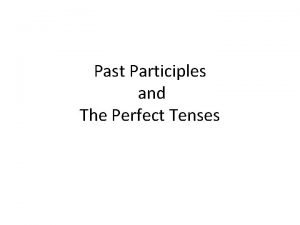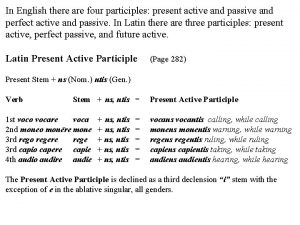In English there are four participles present active





- Slides: 5

In English there are four participles: present active and passive and perfect active and passive. In Latin there are three participles: present active, perfect passive, and future active. Latin Present Active Participle (Page 282) Present Stem + ns (Nom. ) ntis (Gen. ) Verb Stem + ns, ntis = 1 st voco vocare voca 2 nd moneo monere mone 3 rd rego regere rege 3 rd capio capere capie 4 th audio audire audie + ns, ntis + ns, ntis = = = Present Active Participle vocans vocantis calling, while calling monens monentis warning, while warning regens regentis ruling, while ruling capiens capientis taking, while taking audiens audientis hearing, while hearing The Present Active Participle is declined as a third declension “i” stem with the exception of e in the ablative singular, all genders.

Present Active Participle voco vocare call Present Active Participle = vocans vocantis calling, while calling Nom. Gen. Dat. Acc. Abl. Nom. Gen. Dat. . Acc. Abl. vocans vocanti vocantem vocantes vocantium vocantibus vocantes vocantibus vocantis vocanti vocans vocante vocantia vocantium vocantibus vocantia vocantibus calling, while calling

Latin Perfect Passive Participle (Pages 288 - 289) Perfect Passive Participle = 4 th principal part of the verb. 1 st conj. voco P. P. P. = vocatus vocata vocatum - called, having been called 2 nd conj. moneo P. P. P. = monitus monita monitum - warned, having been warned 3 rd. conj. rego P. P. P. = rectus recta rectum - ruled, having been ruled 3 rd conj. capio P. P. P. = captus capta captum - taken, having been taken 4 th conj. audio P. P. P. = auditus audita auditum - heard, having been heard All Perfect Passive Participles are declined as first and second declension Adjectives.

Latin Future Active Participle (Page 289) Future. Active Participle = 4 th principal part of the verb -us + urus. 1 st conj. voco P. P. P. = vocaturus -a -um - about to call 2 nd conj. moneo P. P. P. = moniturus -a -um - about to warn 3 rd. conj. rego P. P. P. = recturus -a -um - about to rule 3 rd conj. capio P. P. P. = capturus -a -um - about to take 4 th conj. audio P. P. P. = auditurus -a -um - about to hear Translations: 1. about to______ 3. intending to______ 2. going to____ 4. destined to____ All Future Active Participles are declined as first and second declension Adjectives.

1. About to wage war against Rome, he went on the following day to the army which had been prepared. (having been prepared) Bellum gesturus contra Romam postridie ad exercitum qui paratus erat processit. (paratum) 2. The senate and the Roman people, who had been rescued from (having been rescued from fire and sword, called Cicero the father of his country. fire and sword) Senatus populusque Romanus qui ex igne et ex gladio ereptus est (ex igne et ex gladio ereptus) Ciceronem patriae ejus appellavit.









